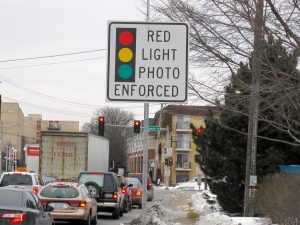Red light camera ban proposed for state, non-home rule towns
By Jean Lotus Staff reporter — January 31, 2017
A ban on red-light cameras in non-home rule towns was passed in 2015 by the Illinois House, but went nowhere. (Chronicle Media)
Could red light cameras be on the way out in Illinois? The despised all-seeing eyes at busy intersections generate lots of cash for municipalities, but public opinion has turned against them.
A ban on red-light cameras in non-home rule towns was passed in 2015 by the Illinois House, but went nowhere. Now its sponsor State Rep. David McSweeney (R-Barrington Hills) is bringing back the concept.
HB 472 would ban red light traffic cameras in all of Illinois and HB 473 bans the cameras in non-home rule towns.
“Red light cameras do not enhance public safety, but they do help local governments generate revenue,” McSweeney said in a press release. “Raising revenue is not a valid reason to continue the red-light camera program in Illinois.”
Red-light cameras (known as automated enforcement measures) are banned in 25 states, according to the national Insurance Institute of National Safety. In Illinois, cameras are permitted in the counties of Cook, DuPage, Kane, Lake, Madison, McHenry, St. Clair and Will — if approved by local municipal authorities.
Drivers are fined up to $100, often for minor violations such as rolling stops before a right turn. Repeat violations can lead to a maximum fine of $500.
The American Civil Liberties Union tracks the use of red-light cameras, which they consider unconstitutional. The ACLU objects to the profits reaped by “private vendors that operate the camera systems and which are often paid a percentage of the fines from tickets,” according to their website.
A U.S. Public Research Group study showed that vendor contracts across the country give control of traffic policy to the vendor, not the municipality.
“Contracts between private camera vendors and cities can include payment incentives that put profit above traffic safety,” the report said.
Cities such as Denver, Los Angeles and Houston have ousted their red-light camera vendors after traffic-safety studies showed the cameras did not make roads more safe — and, in fact, sometimes caused rear-end collisions.
In Illinois, red-light cameras have been the subject of several media scandals. Three employees of Redflex camera company were convicted of paying more than $2 million in bribes to City of Chicago officials to favor their contract. A Chicago Tribune investigation showed camera timers were tweaked to issue tickets during shortened yellow lights, generating 77,000 illegal tickets worth $8 million. A class-action lawsuit against the city alleged Chicago did not give ticketed drivers a second chance to pay their citations before tacking on fines.
Recently, the City of Oak Brook sued neighboring Oak Brook Terrace for installing red light cameras on a bordering intersection near a regional shopping mall. The suit alleges the Illinois Department of Transportation improperly issued a permit for the cameras at Route 88 and 22nd Street. Named in the suit is Nikki Zollar, chief executive officer of SafeSpeed, LLC, which receives 40 percent of revenue from red-light camera violations.
Getting the General Assembly to eliminate red-light cameras may be an uphill challenge. Vendor companies donate lavishly to Illinois politicians at the state and local level. From 2014-16, three red-light companies donated $135,000 to Illinois political committees. Scottsdale, Ariz.-based American Traffic Solutions, Inc. donated $15,000 to campaigns of House and Senate Democrat leaders. Lombard-based RedSpeed Illinois, LLC, a client of politically connected Springfield lobbyist Al Ronan, made 84 contributions totaling around $46,000 to campaigns of 57 local mayors, commissioners and state legislators. Zollar’s Chicago company, SafeSpeed, LLC donated $28,400 in 2014-16 to the campaigns of Cook County officials and local mayors where cameras are installed. SafeSpeed made a $10,000 donation to State Sen. Martin Sandoval (D-Berwyn).
McSweeney may have a lonely fight to stop red-light cameras, especially since the issue often pops up before elections when voters are angry and there won’t be another election for a while.
Nonetheless, Sweeney believes he can acquire the momentum of red-light camera haters around the state to pressure their lawmakers to pass his bills.
“The perception of many Illinois residents is that these cameras are nothing more than an additional way to tax Illinois residents and raise revenue for Illinois municipalities,” Sweeney said in a press release. “It is time to eliminate red-light cameras.”
— Red light camera ban proposed for state, non-home rule towns —








